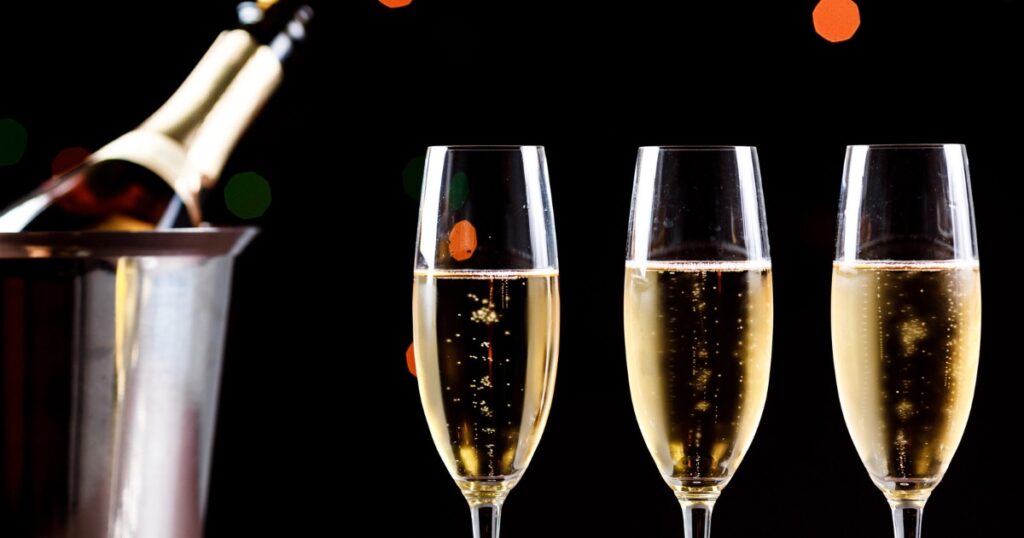First off, opening a bottle of Champagne, what is the right method?
There are traditions, dos and don’ts to opening a bottle of Champagne. Perhaps like any rules they are meant to be broken, but there are also reasons for these rules to exist as they can add a great deal of enjoyment to the occasion reflecting its grandiosity or simplicity. If followed correctly they can show your peers that you know your etiquette.
Here are the basic dos and don’ts
Dos:
- Always ensure the bottle is well-chilled to around 7-9°C (45-48°F) before opening to reduce pressure
- Tilt the bottle at a 45-degree angle away from guests, and while firmly holding the cork, rotate the bottle until the cork eases out with a soft “pop,” not a dramatic fizz that wastes the precious liquid.
Don’ts
- Never point the bottle at anyone or anything valuable
- Don’t use a corkscrew—it’s unnecessary and risks pushing the cork into the bottle
- Resist the urge to “sabrage” (the act of opening the bottle with a saber) unless you’re well-practiced and the setting is appropriate
- A dramatic flair is often admired, but safety and decorum should always be the priority
What glassware is needed to serve Champagne?
Formal occasions: Choose a flute or tulip glass for formal occasions to maintain the effervescence and highlight the champagne’s complexity.
Casual settings: A white wine glass can suffice. Regardless of the glass type, ensure they’re spotlessly clean, as any residue can compromise the champagne’s flavour and effervescence.
Cheers to elevating life’s moments, one perfectly opened bottle of champagne at a time!🥂
What champagne and Champagne manners for the very formal occasions
For those moments where every detail counts there are a series of important dos and don’ts:
Dos:
- Serve:
- Opening: Gently remove the foil and wire cage with poise. When uncorking, aim for a soft ‘sigh’ rather than a loud pop, to maintain the decorum of the setting.
- Pouring: Hold the bottle at the base and gently pour at a 45-degree angle into each flute, allowing the champagne to slide along the side of the glass. This technique preserves the delicate bubbles and aroma.
- Refill: Be attentive to guests’ glasses, offering refills promptly but unobtrusively.
- Chill:
- Ice Bucket Elegance: Utilize an elegant, preferably silver or crystal ice bucket. Place it centrally on the table or within easy reach for service.
- Temperature: Maintain the champagne at an optimal temperature of 7-9°C (45-48°F). Carefully monitor the ice level to ensure consistent chilling.
- Service: Use a clean linen cloth to gracefully handle the bottle when removing it from the ice bucket, ensuring no drips on the table or glassware.
- Drink:
- Glassware: Use high-quality crystal champagne flutes that enhance the visual appeal and effervescence of the champagne.
- Sipping: Savor the champagne with slow, deliberate sips to fully appreciate its complex flavors and aromas.
Don’ts:
- Time Management: Do not serve champagne that has been open and unchilled for an extended period. The ideal serving time for an opened bottle is within 3-4 hours to ensure maximum freshness and effervescence.
- Bottle Rotation: If hosting a lengthy event, plan to open new bottles as needed rather than relying on one that’s been open too long. This practice ensures that each glass served is as fresh and vibrant as possible.
- Single Bottle Commitment: Once a particular champagne has been selected and served, avoid switching to a different type or brand midway through the event. Consistency is key in maintaining a harmonious tasting experience for your guests.
- Quality of Glassware: Ensure the flutes are of the highest quality crystal, clear and without any decorations that might distract from the champagne itself.Handling: Handle the flutes by the stem to avoid warming the champagne with your hands, which can alter its ideal tasting temperature.
- Toasting Protocol: In very formal settings, wait for a toast to be proposed before drinking. The host or a designated guest should lead the toast.
- Refrain from Swirling: Unlike wine, champagne should not be swirled in the glass, as this can disrupt the bubbles and release carbonation too quickly.
Here are the most important formal events that could happen in your life, weddings, award ceremonies and yes, state dinners… oh you mean you don’t think you will ever be invited to a state dinner?
That’s not a problem at leas you may critique’
Weddings
Champagne Recommendations: Opt for the crème de la crème, think Krug Grande Cuvée, Louis Roederer Cristal, or Dom Pérignon.
Food Pairings: Caviar blinis, truffle-infused risotto balls, and oyster shooters, olive tapenade canapés, stuffed mushrooms, truffle-infused cheese.
Award Ceremonies
Champagne Recommendations: Bollinger Grand Année, Perrier-Jouët Belle Epoque, or Veuve Clicquot La Grande Dame.
Food Pairings: Lobster tail bites, foie gras on brioche toast, and golden chocolate truffles.
Charity Balls:
Champagne Recommendations: Perrier-Jouët Belle Epoque, Veuve Clicquot La Grande Dame, Laurent-Perrier Grand Siècle.
Food pairings: Crab and avocado salad, truffled risotto, slow-cooked lamb shanks
Inaugural Events (large scale):
Champagne recommendations: Dom Pérignon P2 Plénitude, Louis Roederer Cristal Rosé, Taittinger Comtes de Champagne.
Food pairings: Caviar or walnut and blue cheese stuffed figs, Peking duck or roasted beet tartare, chocolate truffles or coconut macaroons.
State Dinners (Yes, we know those are hard to get into, but you never know!):
Champagne Recommendations -as if state dinner organisers would need advice!: Moët & Chandon Nectar Impérial Rosé, Piper-Heidsieck Rare, Veuve Clicquot La Grande Dame.
Food Pairings: Smoked salmon canapés, beetroot and goat cheese tartlets, and petite crème brûlées.
These occasions demand nothing but the best. It’s not just about the drink, but the memories intertwined with every sip.
Champagne and Champagne manners for the middle ground celebrations, not too formal, not too casual
When you desire a touch of class without the weighty opulence.
Dos:
- Serve: Pour at a 45-degree angle to preserve those delightful bubbles.
- Chill: A stylish cooler or ice bucket on the table is just perfect.
- Drink: Sip slowly, relishing each effervescent moment.
Don’ts:
- Don’t serve champagne after it’s been out too long; freshness is key.
- Avoid mixing champagnes; once you’ve picked a bottle, stick with it.
- Refrain from using anything other than champagne flutes.
Engagement Parties:
Champagne Recommendations: Laurent-Perrier Brut, Mumm Cordon Rouge, or Billecart-Salmon Brut Rosé.
Food Pairings: Mini quiche Lorraine, stuffed mushrooms, and dark chocolate mousse cups.
Anniversary Dinners:
Champagne Recommendations: Canard-Duchêne Authentic Brut, Nicolas Feuillatte Reserve Exclusive, or Pol Roger Brut Reserve.
Food Pairings: Shrimp cocktail, spinach and feta pastry puffs, and berry parfaits.
Graduation Celebrations:
Champagne Recommendations: Lanson Black Label Brut, Jacquart Brut Mosaïque, or Gosset Grande Réserve.
Food Pairings: Chicken satay skewers, vegetable spring rolls, and lemon tarts.
Casual Sips with Style, Champagne and Champagne manners for the casual occasions
Who said laid-back can’t be chic? Casual does not mean compromising on quality. It’s all about enjoying the moment with a dash of panache.
Dos:
- Serve: Cool and casual, straight from the bottle.
- Chill: Keep the champagne in a simple ice bucket or a chilled picnic basket.
- Drink: Feel free to clink glasses and cheer aloud with friends.
Don’ts:
- Avoid letting the champagne sit out in the sun.
- Don’t be too fussy about the pouring; it’s a casual setting.
- Refrain from overthinking the pairing; let the mood guide you.
Birthday Brunches:
Champagne Recommendations: Andre Clouet Silver Brut Nature, Charles Heidsieck Brut Réserve, or Paul Bara Brut Réserve.
Food Pairings: Avocado toasts, pancake stacks with maple syrup, and fruit salad bowls.
Picnics & Beach Outings:
Champagne Recommendations: Drappier Carte d’Or Brut, Tarlant Brut Zero, or Bruno Paillard Premiere Cuvée Extra Brut.
Food Pairings: Sandwich wraps, potato salad, and berry cupcakes.
Friendly Gatherings:
Champagne Recommendations: Ayala Brut Majeur, Jean Vesselle Oeil de Perdrix, or R. Pouillon & Fils Brut Réserve.
Food Pairings: Margherita pizza bites, veggie platters, and brownie squares.
Conclusion
In conclusion, champagne is a versatile beverage that elegantly traverses a spectrum of occasions, from the most formal galas to casual gatherings. Understanding and respecting the nuances of champagne etiquette for each level of formality not only enhances the experience but also pays homage to the rich tradition and craftsmanship behind this celebrated drink. Whether you’re savoring a meticulously selected vintage in a refined, formal setting or enjoying a vibrant young champagne in a more relaxed atmosphere, the key lies in appreciating the moment and the company. By adapting your approach to serving, choosing, and enjoying champagne based on the occasion’s formality, you can elevate any event into a memorable celebration. Champagne, in its essence, is more than just a drink; it’s a symbol of joy, a toast to achievements, and a companion in both grand and intimate moments of life.
𐡸 𐡸 𐡸 𐡸 𐫱 𐡷 𐡷 𐡷 𐡷
Frequently asked questions
In a formal setting, serve champagne with elegance and attention to detail. Present the bottle on a silver platter, gently remove the foil and wire cage, and pour the champagne at a 45-degree angle into high-quality crystal flutes. Ensure the bottle is properly chilled in an elegant ice bucket and offer refills with discretion.
For formal events, it’s recommended to stick with one type of champagne to maintain consistency and harmony in the tasting experience. If you plan to serve multiple champagnes, such as for a pairing menu, select them in advance and inform guests of the progression.
While champagne can be enjoyed from different types of glasses, traditional champagne flutes are preferred, especially in formal settings. Flutes enhance the visual appeal of champagne’s bubbles and help retain its aroma and effervescence.
Ideally, an opened bottle of champagne should be consumed within 3-4 hours to maintain its freshness and sparkling quality. For longer events, plan to open new bottles as needed.
In formal settings, wait for a toast to be proposed before drinking. The host or a designated guest usually leads the toast. Avoid swirling the champagne in the glass, as this is more appropriate for wine and can disrupt the delicate bubbles in champagne.
🥂



